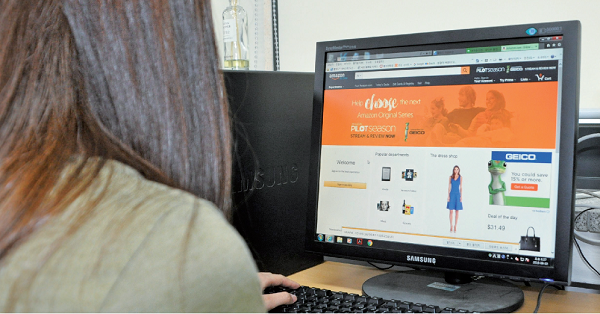
Kim Hyesoo, Department of Law ‘16 at Sookmyung Women’s University, struggles to comprehend the English instructions on her laptop. Still, she makes a genuine effort to understand. Why is she working at it so intensely? Is she studying English? No. She is trying to purchase some overseas products in order to avoid the higher cost she’d have to pay at a shop in Korea. Leery, yet satisfied at doing her best, she hopes she’s placed the order correctly.
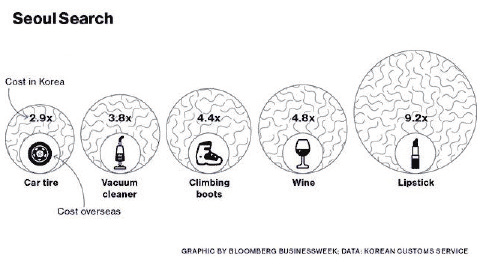
Surge in Direct Overseas Shopping
Direct overseas shopping is a new trend in Korea. The Office of Customer Administration revealed that overseas purchases in Korea have increased constantly since the year 2010 and that the growth rate nearly doubled each year.1⁾ People buy directly from the country of origin through the use of internet shopping malls. While foreign products are available for purchase in domestically, because of the huge import tax on the products, they are sold at excessively high prices. Consumers are fed up and are now looking to purchase the products at much cheaper prices from outside of Korea. In addition, customers today are looking outside Korea because of product diversity. Consumers now have the means to comparison shop beyond the nation limits and are enjoying the means to look at product variation. Because import goods in Korea are limited, customers are only exposed to goods imported by domestic companies. However, shopping online from overseas sites opens up diversity and accessibility to all consumers. According to Hyundai Research Institute's recent report on the market scale of direct overseas shopping, it is predicted that the market is expected to reach 24 billion dollars by the end of this year and can grow to up to 207 billion dollars by the year 2020.2⁾ Direct overseas buying has boomed among university students because of the perks being offered to them. University students, shopping online from overseas sites, are usually given discounts by the website. For instance, Apple provides its university customers with free headphones when they buy Apply products, and equickquick. com offers a 30% discount to international university students on delivery charges.3⁾
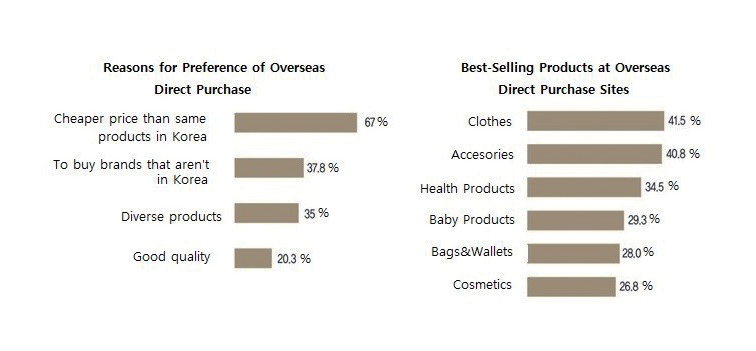
Direct overseas shopping: A direct hit
Despite the advantages, problems do exist. First, there is the problem of refunding. A product that enters Korea is subject to duty. Buyers need to pay taxes assessed on the item based on its price. When a product is sent back overseas to the shop, the buyer is supposed to be refunded both the cost of the product and the imposed tariff. However, if the buyer is unsatisfied with the products and returns the item, the buyer may only receive the actual cost of the item. The tariff paid is almost nonrefundable. The Protection Law exists to ensure consumers are reimbursed the fees paid on customs duty, but consumers encounter so much red tape that it is virtually impossible to get the money back. Moon Chaewon, Department of Business Administration '16 said "Direct overseas purchasing has increased, but information regarding refunding, specifically customs traffic reimbursement is so complicated that consumer end of bearing the brunt of tax charges." To successfully receive a custom tax refund, consumers must fill out numerous documents and submit them to the Korea Customs Service. Individuals, however, are not permitted to apply directly for a customs refund. They must go through a customs broker. Hence, the cost of applying for a refund may equate directly to the actual tax amount one seeks. Also, when making purchases online, the item may be on ‘Back Order.’ In other words, the shop does not have any more in stock. The consumer is asked to wait and once the item is restocked by the shop, the order will be sent to the customer. This may not seem problematic, but a review of data found that overseas purchasers flood the site with lots of questions and concerns about back orders. In reality, customers making direct overseas purchases miss the 'back order' caution due to the language barrier. Also, overseas shopping sites tend to only reveal the item to be backed order once the transaction is complete. In the end, consumers must accept the situation and blindly wait for their ordered item to arrive. This then results in lower customer satisfaction because they are unable to receive the order on the expected date of arrival. Lastly, direct overseas purchasing can have a negative effect on both domestic distribution and society. Currently, the percentage of direct overseas purchasing is 0.11% of private consumption in Korea. In 2012, it grew about 0.16%, and in 2013 it grew gradually until it reached 0.2% in 2014.4⁾ As the increasing rate of direct overseas purchasing shows, consumers are spending Korean won outside of the nation, which if it is continuous to increase could cause distribution enterprises such as department stores and shopping malls can go through the process of profit margin reduction. The problem is not limited to corporations. It will affect the Korean economy as well since net capital outflow increases. For domestic enterprises, direct overseas purchase will start a new rivalry that could see amendments to current policies and prices.
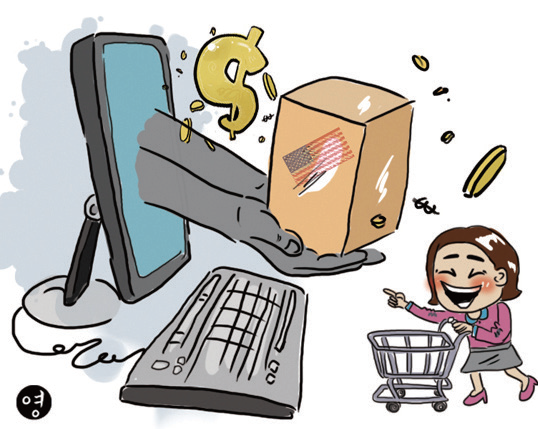
To Avoid the Direct Hit
To resolve issues occurring as a result of direct overseas purchasing, there first needs to be an easier means of attaining a tariff refund. The Korea Customs Service should reduce the complex procedure of attaining a customs tax refund and provide clear information for consumers unfamiliar with how to go about applying for it. The Korea Customs Service should also establish a 'United Portal System to Reassure People'. According to the Korea Customs Service, the agency is creating a 'Nation Design Team' of individual specialists who will found a direct overseas purchasing portal site to aid consumers.5⁾ Through the portal site, the Korea Customs Service says it will provide details on duties and tariffs and how to apply for a customs tax refund so that consumer become better information than before. To address the issue of back order, the homepage manager of direct overseas online malls show more sincerity when selling to international people. Also, customers should not wait blindly for their purchased items, but frequently check on the delivery status of their order. If their item has not been delivered within a week of the promised expected date of delivery, customers should call the foreign companies and enquiry about the status of their order. Moreover, since the use of overseas online websites has increased, the Korean government should provide mediatory service to deal with problems arising from overseas purchases. If a consumer has been unable to resolve a purchase problem such as back ordered products despite various means, they should call the local victim counseling center ‘1372 Consumer Guidance Center.’ The Center helps consumers actively to resolve purchasing issues. Lastly, in order for domestic distribution enterprises to resist the negative effect of direct overseas shopping, they need to open direct overseas online malls to capture the outside world. 'Hallyu' or the Korean wave is still booming all over the world. People outside of Korea are interested in Korean products and Korea. Korean corporations should establish online malls that sell to people outside of Korea to increase sales and profits because the demand for everything Korean is clear. Kim Jong Bak, author of 'Internet Shopping Malls; Contend for Victory by Direct Overseas Purchasing' suggests that online shopping malls that allow purchasing by overseas customers is the way of the future. This could be great for university students. Since an online shopping mall is easy to set up, the number of online malls has increased 14.3% compared to last year.6⁾ University students have the ability to create their own malls, alleviating some students' job hunting difficulties.
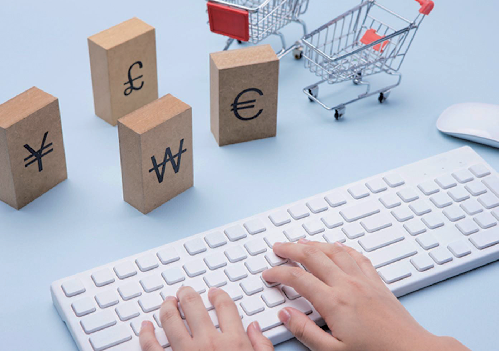
A Safe Playing Field
As the world grows smaller with globaliza -tion, trade between nations increases. Consumers want other nation products at the best price available, so direct overseas purchasing has started to flourish. Han Gyeonpyo, director of Korea Consumer Agency, said, "Our agency recognizes the changing consumption environment and is acting quickly to ease our citizens' concerns and block any infringement of consumption rights and interests of the people in order to ensure a safe consumption environment for all." The Sookmyung Times hopes that consumers will soon be able to enjoy worry-free direct overseas purchases in the upcoming days.
1) Lee Jin, “Will direct overseas shopping exceed 2 trillion won this year?”, IT Chosun, June 21, 2014
2) Kim Sanghun, “Hyundai, “15 billion dollars spent on direct overseas purchases last year could grow to up to 207 billion dollars by the end of 2020””, Seoul Economics, November 15, 2015
3) “America’s ‘Back to school season’ offers ‘student discount’ targeting university students”, Kyunghyang News, July 21, 2016
4) Yu Minju, “Increase in direct overseas purchases could affect Korean economy negatively”, Special Economy, October 16, 2014
5) Pi Yongik, “Inconveniences of direct overseas shopping…back order.. Korea Customs Service will settle it”, E-daily News, March 30, 2016
6) Kim Sooyeon, “Next year’s projected retail business growth slows to 2.4% …internet shopping malls predicted to have high growth”, Digital Times, December 1, 2014


